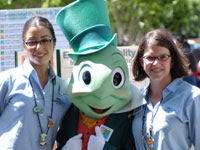Guiding Principles

I admire organizations that have a strong corporate culture, which usually begins with a clear sense of purpose. In some cases, it's a "mission statement." In other cases, it's a statement of values or guiding principles. You might even call it a conscience. Regardless of how it is defined, it is critical. It's certainly no coincidence that the most successful companies infuse these principles into everything they do. It's hard to believe you can boil a company like Nike down to 2 words, but they can: Nike claims to Bring Inspiration and Innovation to Every Athlete in the World. Meanwhile, the BBC asks potential employees to test their personal values against the company's to determine whether the candidate would fit in (Take the test here). In Kansas City, Sprint promotes its value internally as a "single, ownable idea," while other companies, like Disney, go so far as to implement "service standards," defining not only what they do, but how they do it.
It's hard to believe you can boil a company like Nike down to 2 words, but they can: Nike claims to Bring Inspiration and Innovation to Every Athlete in the World. Meanwhile, the BBC asks potential employees to test their personal values against the company's to determine whether the candidate would fit in (Take the test here). In Kansas City, Sprint promotes its value internally as a "single, ownable idea," while other companies, like Disney, go so far as to implement "service standards," defining not only what they do, but how they do it.
It all starts with a clear understanding of WHAT the organization does- and better yet, WHY it matters. This is where the company finds its value. I'm always suprised by how many organizations get by without a clear sense of purpose. Instead of empowering employees to be creative and collaborative, purpose-less organizations breed employees who are often risk-averse, siloed and territorial. Yet, for those with a clear and well-articulated purpose, the best organizations go a step further by not only defining the WHAT and the WHY, they also articulate HOW their mission will be manifested. This permeates all levels from the chief executive to the entry-level hourly.
Fortune Magazine annually lists the 100 Best Companies to Work For, including Google (this year's no. 1) and Kansas City's very own American Century Investments (no. 15). A common thread? Every company on the list provides its employees with a clear purpose, and they are rewarded with loyalty and productivity- which is just as good for morale as it is for the bottom line.

















